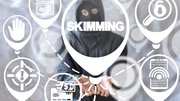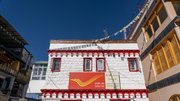News
Diebold expands Indian presence with new subsidiary
A new wholly owned subsidiary in India and a manufacturing deal with Indian IT company Tata Infotech signal Diebold's intent to accelerate its activities in South Asia. With just 11 ATMs per million people, India has one of the lowest ATM penetrations in the world, and is thus ripe for future growth.
October 14, 2002
Diebold Incorporated is expanding its presence in the Indian ATM market, by establishing a wholly owned subsidiary that the company hopes will complement its 10-year-old joint venture with the Chennai-headquartered HMA Group.
The $1.7 billion North Canton, Ohio-based manufacturer, which has a presence in more than 88 countries, in 1992 created Diebold HMA Private Limited, a 50-50 joint venture firm which enjoys a market share of close to 50 percent in India.
The company's main rival, NCR Corporation, operates in India through a 100 percent owned subsidiary, NCR Corporation Private Limited. Last spring NCR opened an ATM management center in Mumbai, which a capacity to handle more than 6,000 ATMs. The Dayton, Ohio-based manufacturer also reportedly plans to open a manufacturing facility in India by year's end.
Both Diebold and NCR, as well as other ATM manufacturers, seem eager to capitalize on what they see as a huge potential market. According to a February 2002 report in the India Times, India has nearly 380 million bank account holders but just 4,500 ATMs. That means India, with 11 machines per million account holders, has one of the lowest ATM penetrations in the world.
A more direct approach
Diebold formed its wholly owned subsidiary, Diebold India Private Limited, with an application to the Foreign Investment Promotion Board (FIPB) for commencing activities in the information technology (IT) sector. Commerce & Industry Minister Shri Murasoli Maran on Aug. 29 approved Diebold's application, based on the approval of the FIPB.
In a related move, Diebold in late July announced a contract manufacturing agreement with the Indian IT firm, Tata Infotech Limited. (See related story Diebold signs ATM manufacturing pact with Tata Infotech)
"The dynamics of the (Indian) market are changing, and we need to be able to respond to that change. If there is anything the joint venture management and ownership doesn't want to do, or chooses not to do, we want to make sure that Diebold will be able to step in and provide it to the market." |
Michael Hillock, Diebold's international president, said that the manufacturer wants to set up a global software support center. "At the same time, we would like to explore the possibility of developing India as a base for manufacturing ATMs to supply and support the South Asian market," he said.
Hillock stressed that India had a high level of literacy, that it was a global player in IT, and that ATM usage was expected to increase throughout the country.
"The actual level and speed of deployment will depend on a number of factors, including the growth of the Indian and global economies," he said. "The capital spending plans of financial institutions will also affect the speed of deployment."
"Not at all happy"
One party that is not happy with Diebold's plans to expand its activities in the Indian market is the HMA Group, its joint venture partner.
"We are not at all happy with the idea of Diebold opening up a 100 percent owned subsidiary when there is an existing joint venture," said Harish Murthi, founder and chairman of the Chennai-headquartered HMA Group that concentrates on the retail banking automation sector, both in India and abroad.
Diebold did not obtain a "no objection certificate" from the HMA Group. While rules require any foreign company with a joint venture in India to get a clearance from its local partner if it wishes to set up a business in similar areas, Diebold's application to the FIPB specifically omitted sales of ATMs to end users in India, which is HMA's primary function.
HMA filed a case with the FIPB, raising objections that its equity will become diluted in the long run with the addition of a wholly owned subsidiary.
"We have had a generally happy relationship with Diebold over more than a decade since the joint venture was set up in 1992, but we are not happy about this," Murthi said.
The market has been abuzz with rumors that Diebold had made several unsuccessful attempts to acquire HMA's holding in the joint venture, but that the two parties failed to reach an agreement on the pricing of the shares.
Murthi confirmed these rumors, but reiterated that it made no sense to part with HMA's share of the equity in the joint venture at a time when the Indian ATM industry's future was so bright.
"We have worked very hard to develop the ATM market in India, right through the 1990s," Murthi added. "Now, when the ATM market in this country has really started to take off, and the time has come for us to reap the fruits of those efforts, we are faced with this problem. This seems to be the sad fate of most joint ventures in India."
Assembly required
Murthi claimed that Diebold HMA employs more than 250 people, whose future would be jeopardized by the establishment of the new subsidiary. However, Diebold believes the new operation will enhance the security of the current Diebold HMA associates.
The manufacturing deal with Tata Infotech, for instance, will serve the best interests of both Diebold and Diebold HMA, Hillock said. Tata Infotech's manufacturing capabilities and existing reputation in India may help Diebold HMA boost its ATM sales.
"The lead times on machines will be drastically reduced so they can offer faster delivery times. They'll also be able to leverage the name of a well-respected Indian company that will use local people to build these machines," Hillock said.
Diebold HMA claims 71 customers, along with the largest service infrastructure in India, with 67 locations to support. It has installed or acquired orders for more than 4,000 machines to date. Among the company's prominent customers with Diebold ATMs are State Bank of India, ICICI Bank, Bank, HDFC Bank, Corporation Bank, UTI Bank, Canara Bank, Global Trust Bank, Indian Bank, IndusInd Bank, ABN Amro Bank, Federal Bank and South Indian Bank.
Murthi said that Tata Infotech, a 100 percent export-oriented unit (belonging to the widely diversified Tata industrial group), has begun assembling Diebold ATMs in India for the global market.
"Tata Infotech gets certain credits for its export efforts, which allows the company to bring in knocked-down ATMs at a lower rate of Customs tariff," he explained. "At the moment, there is a demand backlog of close to 1,000 machines."
The HMA chief said that the Diebold HMA joint venture used to part-assemble ATMs in India during the late 1990s. However, when in January 2001 the Indian authorities lowered the import duty on ATMs to just 15 percent, a part-assembly job made no financial sense.
"It would have been silly for us to assemble ATMs by paying import duty at 25 percent on the components when we could bring in fully assembled machines at a mere 15 percent," Murthi said. "We also cannot compete against 100 percent export-oriented units which can import a certain quantum of products or components free of duty as reward for their export efforts."
According to Hillock, the parent will initially source the core ATMs from the U.S.; they will then be assembled in Tata Infotech's Goa manufacturing facility with locally sourced components.
"While it will be primarily assembly at first, we plan to localize the manufacturing process more and more so that the product is almost exclusively sourced and built in India -- hopefully in the not too distant future," Hillock said. "Manufacturing is a very detailed skill. It's one thing to set up a sales force in a foreign country. It's quite another to set up a manufacturing facility."
Tata Infotech's already established expertise will help Diebold create a facility that can manufacture ATMs for India's burgeoning market as well as other South Asian countries, Hillock said.
The big picture
Michael E. Lindroos, Diebold's senior corporate counsel, has assured Murthi that plans are for the marketing of Diebold's ATMs to remain with the joint venture.
"The machines will be marketed, sold and serviced by our joint venture with the HMA group," Lindroos said. "The local content in the machines will gradually be increased so that the quality can be maintained. We also have plans to bring new products into India, such as smart-card systems and security systems."
As the Indian market continues to evolve, Hillock said, Diebold wants to ensure that it will be able to keep up with demand for a variety of products and services.
"The dynamics of the market are changing, and we need to be able to respond to that change," Hillock said. "If there is anything the joint venture management and ownership doesn't want to do, or chooses not to do, we want to make sure that Diebold will be able to step in and provide it to the market."
Included In This Story
Diebold Nixdorf
As a global technology leader and innovative services provider, Diebold Nixdorf delivers the solutions that enable financial institutions to improve efficiencies, protect assets and better serve consumers.
 ChatGPT
ChatGPT Grok
Grok Perplexity
Perplexity Claude
Claude












